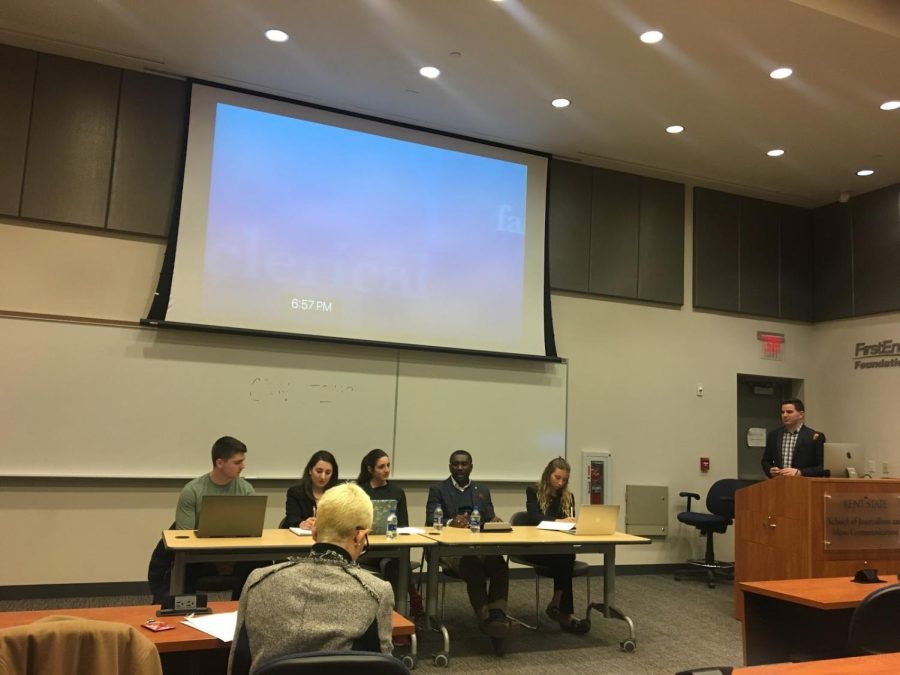Climate change panel warns of impending crises
November 30, 2018
Informing as many people as possible about the realities of climate change is the most important step in fighting it, a panel of Kent State students said at the Countdown to Climate Catastrophe student-led discussion Thursday.
“Educate with compassion,” senior Public Relations major Audra Gormley told the audience.
Topics covered in the College of Communication and Information forum included the Trump administration, immigration and war, and were tied to environmental and economic sustainability. The five major talking points were:
1. Climate change belief is divided politically
Panelist Erik Smith, a graduate student majoring in geology, said 69 percent of Republicans believe climate change is exaggerated by scientists and the media, whereas four percent of Democrats believe the same.
To Smith, the polarization of science seems to be one of the largest obstacles to making real change.
“It’s a political problem, it’s a psychological problem,” he said.
2. Taxing Carbon is only part of the solution
Carbon taxes are fees that governments place on businesses that produce, sell or distribute fossil fuels. While some governments have taken to this popular approach, the students agreed that the tax is not a catch-all solution for the many facets of climate change.
Figuring out the root of other issues like water scarcity and food shortages is another important step in ensuring the planet’s well-being, said Andrews Boateng, a graduate student studying geography.
“A problem identified is half-solved,” he said.
3. The Global North has a responsibility to protect the Global South
Developing nations are sometimes referred to as the “Global South,” while developed nations and the highest emitters of carbon are the “Global North.”
Countries around the world, and until recently, the U.S., have been paying into the UN’s Green Climate Fund to assist and protect Global South nations from the ramifications of climate change.
The panelists said that this type of policy will not only improve the lives of those living in the developing countries but also protect the resources of the Global North from depletion in the long run.
But the ability to adapt to the inevitable changes that are no longer changeable is key, Boateng said.
“If we don’t build an adaptive capacity, some of these countries will be wiped out in the next century,” he said.
4. Climate Migrants will only increase in numbers
Climate refugees or climate migrants are those displaced by conflict or the lack of economic opportunity stemming from environmental issues. As many as 143 million people may become climate migrants in the coming years, according to a report by World Bank, and the panelists agreed that number will only rise if inaction on global warming persists.
This influx of people straining resources will cause misplaced anger among Global North citizens, said senior environmental conservation biology major Jessica Saralino.
“People will blame the migrants,” she said.
5. Education is the best solution
Each of the panelists agreed that the best strategy for stopping the harmful effects of climate change is education. Some stressed educating others, some stressed educating yourself, and some warned against fake news.
Gormley suggested social media was the next powerful medium to inform the masses.
“It’s an opportunity, rather than a hindrance,” she said.
Madison Patterson is the International Students and Issues reporter. Contact her at [email protected]

























